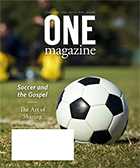
April-May 2018
Soccer and the Gospel
------------------
|






The Art of Sharing
By Don Matchett
A wonderful aroma had overtaken our house and saturated my 14-year-old senses. Stew was a staple in our home. Filling, cheap, and easy to make, any combination of various foods in a pot can be classified as a stew. But this meal was different—we actually had meat.
An air of anticipation filled the house. Usually, we were told, “Save some for your sisters and brothers.” In our house, that wasn’t an exaggeration. We typically had enough, but just enough. Nevertheless, this time we weren’t given a limit. This time, we enjoyed plenty. My mother was very clear, “Eat as much as you want, but don’t waste.”
A generous neighbor had shared fresh meat from their farm “because it was the neighborly thing to do.” This certainly would not be the last time we were the grateful beneficiaries of his generosity. However, this first instance of sharing made such an impact on my memory that, even as I write, I can still picture all the gleeful expressions around that pot. What’s more, I can almost taste that first spoonful!
The act of sharing is a fundamental duty, but it does not come instinctively. Rather, it seems to be passed from one person to another or directly imparted. Anyone who has ever experienced the attitude of a toddler knows this immediately. For youngsters, the notion of sharing appears difficult to comprehend. Young children believe they are the center of the universe. From their point of view, “Everything belongs to me!” While we perceive this childish selfishness as being spoiled or self-centered, the truth is, this is who we are as human beings. Sharing is not easy and chafes our iniquitous human nature.
The mystery is this: though sharing does not come naturally, it seems to permeate every culture. Even the harshest barbaric heathen is willing to share with his family and with others in his camp. And, even more mysterious, the less we have the more likely we are to share.
I recently watched a documentary about the Cup`ik Eskimos on Nunivak Island, off the southwest coast of Alaska. The tribe lives in one of the harshest environments on the planet. During the winter months, the island becomes a barren wasteland with high temperatures reaching only -30º for months at a time. To survive, the inhabitants literally eat anything available—fish, seal, walrus, reindeer, and muskox. Even with such harsh conditions, the first deed after a successful hunt is the act of sharing. An island leader poetically said, “We must be a blessing to others so we will be blessed with meat again. So, the first thing we do is give part of our blessing away.”
The act of sharing belongs to God. As with every good thing, it originated with Him. This theme runs throughout the Bible, from cover to cover. Sharing is at the center of God’s plan. Giving and sharing is one of the most important principles we learn from God’s Word, especially in light of the incomprehensible value of the gift of His Son.
In Genesis, we read one of the most important accounts of why we are obligated to share. The whole Abrahamic Covenant can be summed up in one line: “I will bless you, and you will be a blessing.” Yet, we can learn even more here. The covenant of Abraham displays the blueprint of God’s plan, and it teaches our own responsibility in the Kingdom. We are blessed to be a blessing through resources, finances, and especially the gospel. Shared blessings are the fuel that propels the engine of the Good News of Jesus Christ.
SHARED BLESSINGS ARE THE FUEL THAT PROPELS THE ENGINE OF THE GOOD NEWS OF JESUS CHRIST.
Missionary writer Don Richardson refers to these twin promises as top-line (I will bless you) and bottom-line (you will be a blessing). Richardson reminds us any top-line blessing equals a bottom-line responsibility to bless others. When God cares for us, we are responsible to care for others.
If this is true, we can’t enter a career or earn money simply to meet our own desires. We must remember God places us in these careers to earn money to provide for our families…and to show love and mercy to others. Sharing should be the instant reaction to the bewildering love and mercy God has shown us in our own circumstance.
The greatest challenge confronting Christians in the United States is the unhealthy infatuation with top-line blessings without accepting the bottom-line responsibility. The “pursuit of happiness” has produced matchless wealth, power, and ingenuity, but if we fail to love and comfort our neighbor, we miss our role in the Kingdom altogether. Furthermore, we are in danger of creating gods of ourselves, ruling our own meaningless micro-kingdoms.
If I am honest, when I think of all the blessings God has poured out on me personally I am humbled. I spend more for cell phone service per month than the average monthly salary of families in many countries. I certainly am not wealthy by U.S. standards, but compared to the poor in the rest of the world, I am wealthy. So are you. God has richly blessed us, especially those of us in the Western world. The average household ($50,000 a year) in the United States earns more than 99% of the world’s population. Even those considered in “poverty” in the United States ($23,000 a year) fall among the top 19% of the richest people on the planet. I do not believe it a coincidence the United States is still the most “sending” nation in the world. With great blessings comes great responsibility.
Henry Drummond said, “The obvious lesson in Christ’s teaching is that there is no happiness in having and getting anything, but only in giving.” Our blessings were not intended only to give us comfort and security, but to expand the reach of the gospel. We are truly blessed to be a true blessing.
About the Writer: Don Matchett serves with FWB International Missions as director of church relations and development.
A native of Arkansas, Don and his family recently moved to
Mt. Juliet, Tennessee.
|
|

